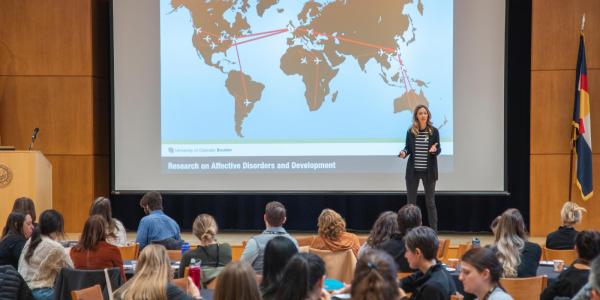
Faculty members play a critical role in supporting the success of students with disabilities. As we kick off the fall semester, you may begin receiving disability accommodation letters from students in your classes.
Here are five ways you can support students with disabilities as a faculty member on campus.
1) Familiarize yourself with Accommodate
Accommodate is the software program that CU Boulder uses to manage disability accommodation requests and implementation. Once students have been approved for accommodations by the Disability Services office, they can generate accommodation letters for their professors each semester. You will receive an email notification via your CU Boulder email account for each student who has generated a letter for your class.
Faculty can sign into Accommodate using their IdentiKey and password. Once signed in, you’ll be able to review all student accommodations for each of your courses. For assistance logging in to or navigating Accommodate, check out our Faculty User Guide online.
Note: We encourage all students and faculty to review accommodation letters together in order to determine the best way to implement accommodations in each class.
2) Understand faculty expectations
Students are expected to schedule a meeting with their faculty members to discuss their accommodations. During this meeting, it is important for faculty members to clarify what types of accommodations a student has and how they will be implemented in a specific course. Please note that a student may elect to not use all of their indicated accommodations in your course.
While you’re meeting with your student, consider asking them what learning challenges they may be facing and what has been helpful in the past. If you’re unsure about an accommodation or feel that it would limit or undermine the intended learning outcomes of your course, please consult with Disability Services.
Note: All student disability and accommodation information is confidential in accordance with federal laws, including FERPA and ADA. Students are also not obligated to share a specific diagnosis, condition or disability with faculty members while discussing their accommodations.
3) Include a disability statement on your syllabus
Disability Services recommends using the following syllabus statement for your course(s):
“If you qualify for accommodations because of a disability, please submit your accommodation letter from Disability Services to your faculty member in a timely manner so that your needs can be addressed. Disability Services determines accommodations based on documented disabilities in the academic environment. Information on requesting accommodations is located on the Disability Services website. Contact Disability Services at 303-492-8671 or dsinfo@colorado.edu for further assistance. If you have a temporary medical condition or injury, please visit our Temporary Medical Conditions page."
4) Create an inclusive and welcoming environment
When talking about disability, it’s important to use person-first language. For instance, it is better to say “students who use wheelchairs” instead of “wheelchair-bound students.” Keep in mind that students can let you know if they identify themselves in a different way.
It’s also important to provide referral support for students who may need accommodations through Disability Services. For instance, if a student mentions that they have a disability, diagnosis, 504 plan or temporary medical condition (such as a broken hand or concussion), you can support their success by recommending and referring them to Disability Services.
5) Plan ahead for exams
Faculty are expected to clarify and/or confirm testing accommodations with students prior to each quiz, exam or test.
The Student Testing Center (located in the CASE Building) provides proctoring assistance for eligible students with registered testing accommodations through Disability Services. A students’ accommodation letter will provide you with the information on which students are eligible to use the Student Testing Center. All professors should meet with students to discuss how their accommodations will be met for exams prior to using the center. To learn how to support students with testing accommodations and scheduling exams, please visit the Student Testing Center Faculty Information page.
Support resources for faculty and staff
If you are looking for more information about disability accommodations or are interested in attending development or training opportunities to learn how to better support students, there are resources available to help.
Disability Services
Disability Services is dedicated to providing students with disabilities an equal opportunity to participate in university programs, courses and activities through reasonable accommodations and services. Our office is here to support students, staff and faculty with accommodation requests, implementation, guidance and general information. Check out our staff and faculty resources page for more information.
Student Support and Case Management (SSCM)
SSCM provides support to students throughout their college career and helps them achieve their academic and personal goals. Faculty and staff can refer students to SSCM in order to help connect them with support resources and help them come up with a personalized action plan for success.
Outreach presentations
Health and Wellness Services offers a variety of presentations and programming on topics such as stress relief, relationship wellness, sexual health, supporting survivors and more that faculty and staff can request to support their students holistic well-being.
Supporting Student Resiliency Training
The Supporting Student Resiliency Professional Development Series provides CU faculty and staff with concrete skills to better support students. Sessions focus on areas critical to student retention and success. Faculty and staff can attend any individual session; those attending all three will receive a non-degree certificate.
Mental Health First Aid Training
Health and Wellness Services provides free Mental Health First Aid training to students, staff and faculty. This training helps a person with no clinical training to assist someone experiencing a mental health crisis. Participants will identify risk factors and warning signs, engage in experiential activities and learn about evidence-based treatments and support strategies. Registration is available online.





